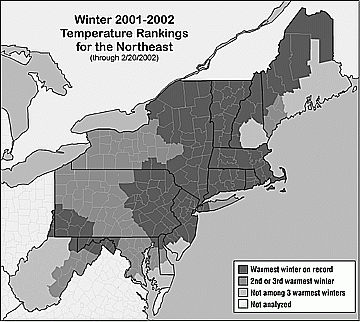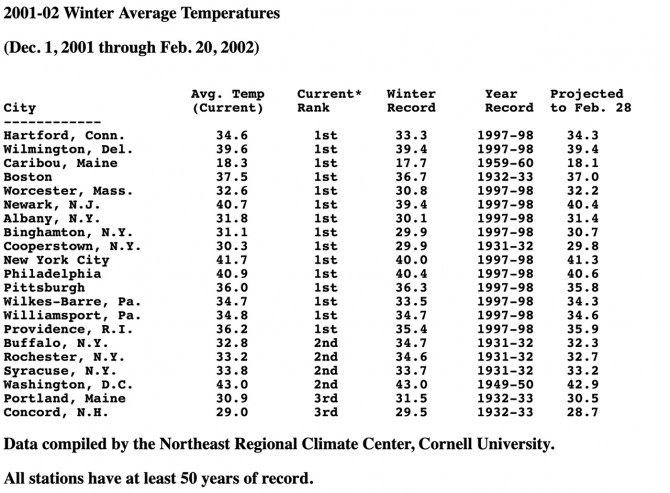On thin ice: Northeast winter destined to be warmest on record, says Cornell climate center
By Blaine Friedlander
If current trends continue for the Northeast through Feb. 28, then the meteorological winter of 2001-02 will be the region's warmest on record, with an average temperature above freezing for the first time in 107 years of official record-keeping, say Cornell University climatologists. (Winter is defined meteorologically as Dec. 1 through Feb. 28 or Feb. 29.)
The Northeast's previous warmest winter was recorded 70 years ago with an average 32 degrees Fahrenheit between Dec. 1, 1931, and Feb. 29, 1932. The region's second-warmest winter, in 1997-98, had an average of 30.8 degrees.
"If you look at a climate map of the entire region, you'll see that more than half of the Northeast is having its warmest winter ever. Most of the rest of the region is having its second- or third-warmest winter. That's why I think this winter will go down as the warmest on record for the entire Northeast," says Keith Eggleston, senior climatologist at the Northeast Regional Climate Center (NRCC) at Cornell.
Eggleston says that while temperatures have been warmer than normal, this is not necessarily part of a larger, global-warming trend. Similar warm winters also occurred in the Northeast in the 1930s. "The jet stream has been farther to the north than normal. Usually it is a little farther to the south," says Eggleston. "This pattern has been fairly consistent all winter long. The jet stream has been surprisingly stable, surprisingly consistent. So we're not getting the Canadian air or the severe cold outbreaks that we would normally see."
Here are the Northeast's warm spots: Vermont, Connecticut, Massachusetts, northern New Hampshire, southern Maine, most of New Jersey, eastern New York, eastern Pennsylvania, southwestern Pennsylvania, the panhandle of West Virginia, northern Maryland and the northern tip of Delaware. Boston's record high average temperature of 36.7 degrees, set in 1931-32, is on the verge of being broken, says Eggleston. Using new, proprietary software that evaluates historical climate data, the NRCC has projected the city's meteorological winter average temperature at 37 degrees.
Even a traditionally cool spot like Caribou, Maine, currently is averaging 18.3 degrees, making this the community's warmest winter on record. The NRCC projects that the average temperature for the winter, which includes the days remaining in February, will be 18.1 degrees, meaning that Caribou's old record of 17.7 degrees, set in 1959-60, will be broken.
Media Contact
Get Cornell news delivered right to your inbox.
Subscribe
